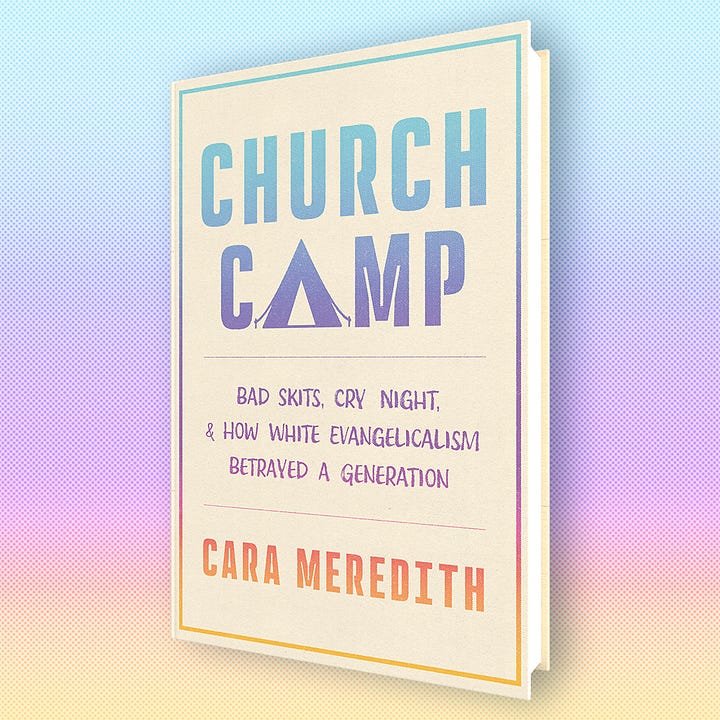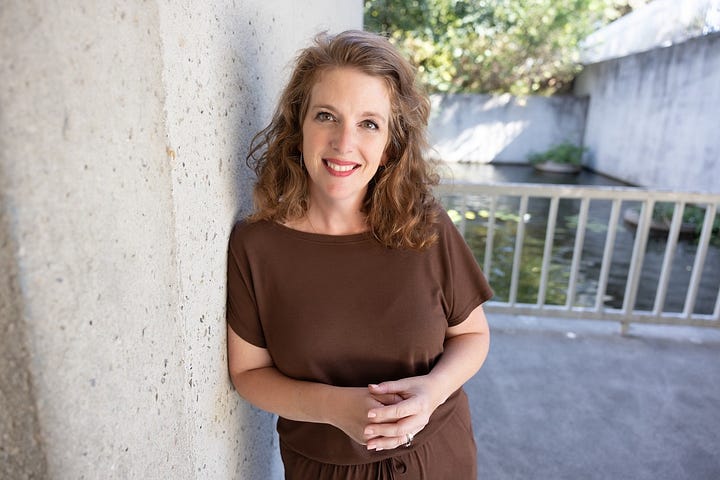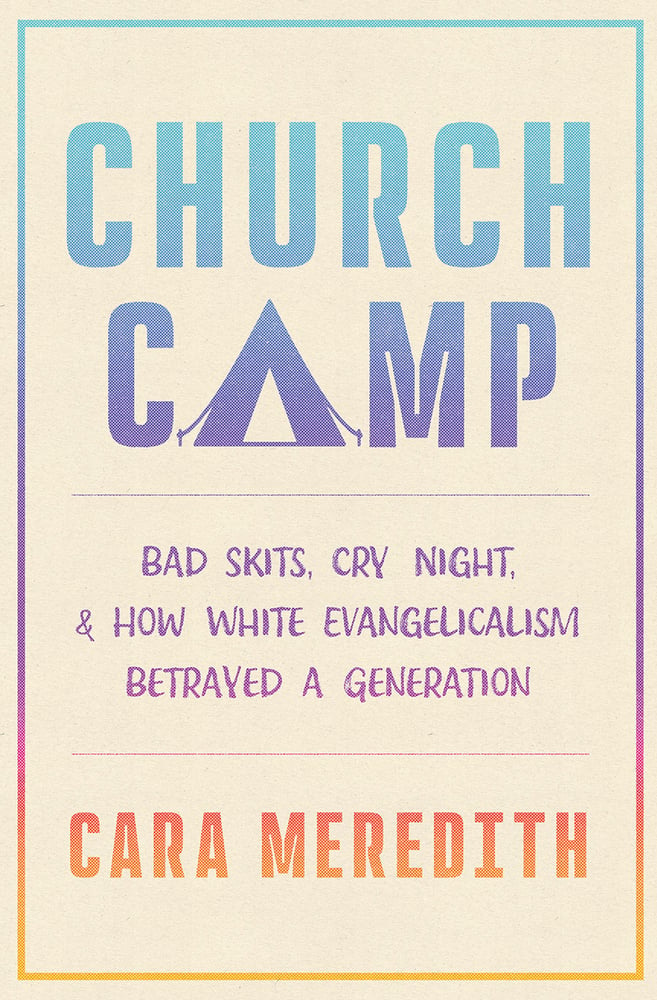Friends,
As a Christian ethicist and someone who has spent decades reflecting on the moral witness of the church, I find ’s new book Church Camp: Bad Skits, Cry Night, and How White Evangelicalism Betrayed a Generation to be both a necessary reckoning and a deeply moving elegy. Cara Meredith writes from within the white evangelical camp culture she once helped lead, offering stories that are piercing, honest, and at times heartbreaking. And yet, I want to acknowledge: there is still something good and beautiful about bringing young people together in sacred spaces, spaces where they can unplug, connect, and ask big questions about faith and life. But too often, evangelical camps have trafficked in shame and fear instead of love and truth. We have so much work to do. If we hope to make camp what it ought to be—a place of genuine welcome, learning, and spiritual formation—we must first reckon with what it has been. Church Camp is a vital contribution to that much-needed conversation. I hope you’ll take a few minutes to read this thought-provoking excerpt.
DPG


An Excerpt from Chapter 4 of Church Camp, “Dirty Rotten Little Sinners” by Cara Meredith
On the fourth night of camp, I would often tell one of my favorite stories and crack open a can of slimy, theological worms as a result. As the story goes, when I was a freshman in high school, my friend and I had the brilliant idea to hop a fifteen-foot-tall chain-link fence at the back of our school’s football field. She turned out to be a professional fence-hopper, or so it seemed, ascending and descending the fence in approximately 3.4 seconds. I turned out to be more of a fence-trier: seven minutes in, when I finally reached the top of the fence and proceeded to lop one leg over the horizontal metal pole, my long, D. J. Tanner-like sweater and matching white stretch pants turned against me. The spiky metal twists at the top of the fifteen-foot fence refused to release their grip. The spikes did not let up, not when my fake penny loafers tried to kick their way out nor when my Esprit bag, loaded with a barrage of textbooks, flapped in the breeze, heavy fabric thumping against metal—nor even when all three of the high school football teams stopped their afternoon practices to watch the girl who was stuck at the top of a fence.
“I was stuck, helpless,” I would say to the campers. “There was nothing I could do to get over the fence. I was helpless on my own.” I didn’t have to tell them, at least not yet anyway, that my friend quickly ascended and descended the fence a second time, while I made my way back down the way I came up. A couple hundred yards later, we found a hole in the fence—a hole big enough for both of us to walk through, unencumbered by Esprit bags, ruined stretch pants, and bloody hands. I didn’t always tell campers this part of the story because it wasn’t the point or the end goal; the point was that I was stuck and helpless. “The Bible calls that stuck situation sin,” I would declare. “We try and fix this problem of feeling stuck on our own. We feel hurt, but really we’re living life on our own, apart from God. We’re separated from God—that’s the definition of sin. Each one of us has sinned, and each one of us has gone our own way. Each one of us is stuck in this thing called sin.”[i]
I would often add that sin is real. Sometimes I would hold up a sign with the three-letter word sIn, with a little s and a little n overshadowed by a huge capital I in the middle: because when we sin, the I in sin is bigger and more important than anything else. “It’s like saying what I want for my life is more important than what you want, God,” I would often add.
An analogy, or two, also often accompanied this night: Sometimes I dragged two chairs across the stage. At first, the chairs faced one another as if to mimic a sit-down, face-to-face conversation with another person. Although that’s how chairs should functionally operate, something else happened when sin came into the picture. Sin turned the chairs around. Instead of the chairs facing one another as intended, the backs of the chairs faced one another. “It’s like playing musical chairs without any of the benefits,” I might add. “No loud music, no chair-wrestling to see who gets the seat, no coveted prize at the end.” And then there were the years of dragging giant refrigerator boxes wrapped in red wrapping paper across the stage. Here, a demonstration for sin wasn’t too hard: I could just push or throw the gift to the back of the stage. (Letting the results of “sin” tip off the front of the stage, into the laps of unsuspecting campers or into a blazing campfire pit, would have made for excellent dramatics but was, admittedly, a little too over the top.)
Whatever the analogy, the sin talk had to end at some point. Far from feeling like a beloved child of God, campers instead left feeling the weight of the human condition—which was, of course, the entire point. Because within this framework, every person in that place had to feel the heftiness and consequences of sin in order for God to whip out a Savior-Son and solve the problem a night later. I would often end the night by equating sin to a virus that runs inside each one of us, deep inside our bodies. “We’re all infected with this virus, with this separation from God, even if the symptoms come out differently,” I would somberly declare. No sooner than I began ticking off symptoms of the virus—lying to your parents, smoking pot, sleeping around, getting drunk as a skunk—I’d put one last nail in the coffin and end the night with a reminder that “the wages of sin is death.”[ii] The consequence of this virus was death, plain and simple. It’s almost as if I wanted these children and youths to leave feeling like worthless pieces of trash, left to rot and mold and disintegrate in the balmy heat. Left to your own devices, child, you’re going to destroy yourself. And there’s nothing you can do about it.
* * *
Many of the former campers I interviewed recalled speakers using the two chairs, while others recalled pieces of paper being ripped in half. One woman wrote, “I remember being told that I am a sinner, and sin smells and God doesn’t want to be around sin. Camp staff would tell us, ‘You get up in God’s nose,’ and hold a snotty, crumpled-up tissue toward the audience.” A number of folks recall plastic pitcher analogies in which pitchers became symbols of purity and pollution, of righteousness and sin. A speaker would hold up a pitcher, often filled halfway with water. Into it, they would pour food coloring, juice, a box of cereal, a cup of slop from the food waste bucket, a scoop of dirt from the ground—really, anything they could get their hands on to make the contents inedible and dirty. “Would you want to drink from this pitcher?” they would ask campers, slowly showcasing the goopy liquid from one side of the stage to the other. “Neither does God.” (The same gross pitcher would often return a night later, only to be replaced by a pitcher of clear, unsullied water. In this example, Jesus becomes the Great Purifier. Through him, the analogy goes, God makes the dirty water clean again.) Halfway through the week, sin became a trump card to evangelical belief systems, a scare tactic often used to frighten kids into making the only right choice.
The problem, of course, is that sin wasn’t the most important thing to Jesus. He really wasn’t interested in defining people by their sinfulness but by their belovedness. Nevertheless, white evangelical church camps tend to focus on concepts of human depravity when it comes to explaining how Jesus did what he did on the cross. Called penal substitution for short, or the penal substitutionary view of the atonement if you really want to put your dancing shoes on, according to one writer from The Gospel Coalition, this theory “holds that the most fundamental event of the atonement is that Jesus Christ took the full punishment that we deserved for our sins as a substitute in our place, and that all other benefits or results of the atonement find their anchor in this truth.”[iii] Put another way, in this belief system, the only way to make Jesus the missing puzzle piece to the problem of sin a night later is to first understand the phrase “full punishment that we deserved for our sins.”[iv] It’s to turn a message of a loving God who says, “You are beautiful and you are loved” into a transaction. According to this view, because “Jesus paid the penalty for sin in a legal sense, purchasing our redemption at the cost of his blood,”[v] humans are left with no other choice. They have to make right a wrong. But until this right-making happens, campers get to feel like a piece of shit, even if just for a night.
* * *
At what point does staking claim to an atonement theory, such as penal substitutionary atonement, cross the line? When do good intentions instead result in further harm, let alone psychological and spiritual damage? On the one hand (or in the case of camp, on the one day), campers receive a message of unending, abounding love: God loves you more than anything else. Then the script is flipped: But God believes you are dirty and worthless, a sinner in every sense of the word. A day (or in some cases, a half a day later), a solution to the contradictive but emerges through a “God who can only effect the salvation of sinners through an act of violent retribution.”[vi] But the effects are nonetheless jarring, both in the immediate and in the aftermath, often years and decades later. Harsh chords of cognitive dissonance begin to play their haunting tune when campers are forced to wrestle with these realities, both of what this great and perfect deity supposedly believes about them and also of what this means they should believe about themselves.
Lest the reader think I have wandered too far off course, consider the following answers to one of the questions I asked interviewees: What was the theology communicated or that you perceived at camp?
“Jesus saved you from an angry God. You were saved from going to hell.”—James
“You’re dirty, but don’t worry, God loves you so much that he killed his only son.”—Holly
“Jesus loves me but his dad thinks I’m a piece of shit.”—Kent
“I’m a wretched sinner and I don’t exist. And I cannot exist without God.”—Jessica
“You’re bad. God has to have atonement for your sin. So, God’s going to send his son, but because God is good, everything’s going to turn out all right if you just say yes.”—Billy Jack
“You’re a sinner and you’re dirty and God’s love can’t get to you anymore.”—Sarah
It’s no wonder a get-saved mentality often exists in such an environment: when humans feel robbed of the very goodness that lives within them, that is inherently them, of course they’re going to want to do anything in their power to make right the wrong—including any wrongs they’ve come to believe about themselves, deep down inside. Of course, they’re going to want to return to a place that centers itself on an orbiting, all-consuming kind of love instead of on pounding threats of hate, shame, and guilt from a wrathful God dead set on getting his way. Because when the dissonance between the reality of a loving God who also thinks you’re a piece of trash becomes part of the framework of white evangelicalism, “you put human beings in two categories: the saved and the damned, the beloved and the hated.”[vii] Is it any wonder that former campers and camp staff members feel harmed by the theology they preached, damaged by the singular message they received?
[i] “We try and fix this problem”: Did you catch the penultimate nod toward penal substitution’s number-one verse? Romans 3:23, baby.
[ii] “the wages of sin is death”: Romans 6:23, entirely ignoring the second part of the verse altogether, “But the gift of God is eternal life in Christ Jesus.”
[iii] “sin, refuse to repent”: Thomas Schreiner, “Substitutionary Atonement,” The Gospel Coalition, accessed June 17, 2024, https://www.thegospelcoalition.org/essay/substitutionary-atonement/.
[iv] “full punishment that we deserved for our sins”: Schreiner, “Substitutionary Atonement.”
[v] “Jesus paid the penalty for sin”: Brian Arnold, “Did the Church Fathers Affirm Penal Substitutionary Atonement?” 9Marks, August 20, 2019, https://www.9marks.org/article/did-the-church-fathers-affirm-penal-substitutionary-atonement/#:~:text=Since%20the%20Reformation%2C%20Protestants%20have,place%20and%20paid%20our%20penalty.
[vi] “God who can only effect the salvation”: Scott J. Higgins, “Why We Need to Move Away from Substitutionary Atonement,” October 23, 2013, https://scottjhiggins.com/why-we-need-to-move-away-from-substitutionary-atonement/.
[vii] “you put human beings in two categories”: Brian McLaren, “Q & R: Penal Substitutionary Atonement,” March 14, 2012, http://brianmclaren.net/q-r-penal-substitutionary-atonement/.
Cara Meredith is a sought-after speaker, public theologian, and development director who found home at a church camp in the Santa Cruz Mountains. After serving in various roles, she continued as a speaker for two decades at camps up and down the West Coast. With a master of theology (Fuller Seminary) and a background in education and nonprofit work, she is also the author of The Color of Life. Her writing has been featured in national media outlets such as The Oregonian, The New York Times, The Christian Century, and Christianity Today, among others. She lives with her family in Oakland, California. Subscribe and follow her Substack at: carameredith.substack.com.
David P. Gushee is the Distinguished University Professor of Christian Ethics at Mercer University since 2007, Chair of Christian Social Ethics at Vrije Universiteit (Free University), and Senior Research Fellow at its partner school, International Baptist Theological Study Centre. He is the author, co-author, editor, or co-editor of 30 books, including the bestsellers Kingdom Ethics and Changing Our Mind. His other most notable works are Defending Democracy from Its Christian Enemies, After Evangelicalism, and most recently, The Moral Teachings of Jesus. Learn more at davidpgushee.com.






THIS!!!! A million times “YES”!!! I’m 64 and still recovering …
This! At church camp with a friend (a denomination different than my own), it became very clear that unless I was baptized full immersion in the camp pool THAT WEEK, I’d spend eternity in hell.
Being Methodist, I’d never been baptized like that, and I didn’t want to risk it, so I was baptized with my best friend at my side just to be safe.
Beyond just the bad theology and scare tactics, other incidents in my young church camp life became the foundation for my unraveling at age 14, and later for the fiction I would write.